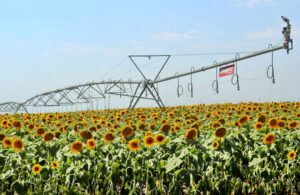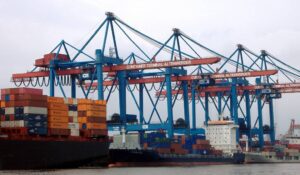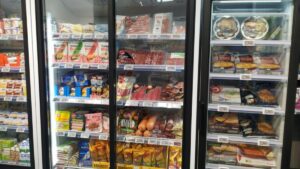
Oil prices are rising on Wednesday, recovering slightly after the collapse the day before.
The cost of October futures for Brent on London’s ICE Futures is $100.01 per barrel by 8:06 a.m. on Wednesday, which is $0.7 (0.7%) higher than at the close of the previous session. As a result of trading on Tuesday, these contracts fell by $5.78 (5.5%) to $99.31 per barrel.
October Brent futures expire at the close of the session on Wednesday. More actively traded November contracts added $0.94 (0.96%) in price, trading at $98.78 per barrel.
The price of futures for WTI oil for October in the electronic trading of the New York Mercantile Exchange (NYMEX) is $92.51 per barrel by this time, which is $0.87 (0.95%) higher than the final value of the previous session. By the close of the market the day before, the cost of these contracts decreased by $5.37 (5.54%) to $91.64 per barrel.
Experts from the OPEC+ technical committee have raised their estimate of the oil surplus in 2022 from 0.8 million bpd to 0.9 million bpd, according to reports prepared for the meeting of the technical committee scheduled for August 31, which Interfax has read.
Based on the reporting, experts downgraded their estimate of oil demand growth in 2022 under the baseline scenario from 3.4 million b/d to 3.1 million b/d, to 100 million b/d; growth in supply – from 5.8 million b/d to 5.6 million b/d to 100.9 million b/d.
Traders, meanwhile, are waiting for the US Department of Energy’s weekly report on commercial stocks of oil, gasoline and distillates in the country, which will be released later on Wednesday.
Experts on average expect oil inventories to fall 1.9 million barrels, gasoline more than 1.3 million barrels and distillates nearly 1.2 million barrels, according to a S&P Global Commodity Insights survey.

The focus of traders remains the situation in Libya, as well as the upcoming OPEC + meeting, which is expected to discuss the possibility of cutting production.
The cost of October futures for Brent oil on the London ICE Futures exchange by 8:15 quarter on Tuesday is $104.28 per barrel, which is $0.81 (0.77%) lower than the closing price of the previous session. As a result of trading on Monday, these contracts rose by $4.1 (4.1%) to $105.09 per barrel.
The price of futures for WTI oil for October in the electronic trading of the New York Mercantile Exchange (NYMEX) is $96.76 per barrel by this time, which is $0.25 (0.26%) lower than the final value of the previous session. By the close of the market the day before, the cost of these contracts increased by $3.95 (4.2%) to $97.01 per barrel.
Over the weekend, clashes between two armed groups took place in Tripoli, as a result of which more than 30 people were killed, Bloomberg reported. This raised fears that Libya is waiting for another full-scale conflict, as a result of which oil supplies to the world market will be reduced. State oil company National Oil Corp., however, said on Monday that the country’s oil production remains at 1.2 million bpd.
“A new wave of Libyan production cut fears, coupled with uncertainty about the upcoming OPEC+ meeting, provided support for the oil market on Monday,” said Warren Patterson, head of commodity strategist at ING Groep NV. “However, without major supply disruptions or interventions OPEC+, we can hardly expect a significant rise in prices in the short term.”

Most oil extraction plants in Ukraine stopped working due to Russia’s military aggression against Ukraine, but in April-May, the plants in the western, central and southern regions of the country began to resume operations due to an increase in sunflower processing margins up to $200/tonne.
“Currently, processors are actively buying sunflower against the backdrop of disappointing production forecasts for the next season… Some plants provide processing services at a price of $80-150/tonne, while others buy sunflower at UAH 15,000-16,500/tonne, receiving a processing margin of up to $200/tonne,” according to the website of the electronic grain exchange GrainTrade.
According to its data, the resumption of the work of Ukrainian oil extraction plants in the western, central and even southern regions of the country is caused by a sharp reduction in the price of sunflower due to difficulties with its export from Ukraine due to the blockade of the country’s seaports by Russian ships.
GrainTrade notes that the price of sunflower will continue to grow, as it is under pressure from its significant stocks from producers and processors, as well as difficulties with the export of oil products – sunflower meal and cake.
“Now it is difficult for processors to sell meal and cake to European consumers due to the increase in logistics costs and falling prices in the EU amid an increase in the supply of Ukrainian products. At the same time, producers are in no hurry to sell sunflower seeds at low prices, expecting an increase in production costs in the new season,” the grain exchange said.

Prices for goods imported into Germany jumped 31.7% in April, a record pace since the 1974 oil crisis, according to the country’s Federal Statistical Office (Destatis).
In particular, the cost of energy imports soared 2.5 times (157.4%) in annual terms, including natural gas increased in price four times, oil – almost 1.8 times (77.5%). Excluding energy carriers, import prices increased by 27.6%.
Among other categories of goods, the most impressive growth was recorded by prices for fertilizers and nitrogen (by 2.9 times), aluminum (by 1.8 times), iron, steel and ferroalloys (by 1.6 times). Imported plastic rose in price by 27.7%, machinery – by 7.9%, cars and auto parts – by 5.7%.
The cost of foreign purchases of food products increased by 20.7%, including coffee – by 68.6%, cereals – by 55.8%.
Compared to March, prices for imported goods increased by 1.8%.

The restaurant market in Kyiv has shrunk by half, since the beginning of the war at least a third of establishments have been closed, Olga Nasonova, co-founder of the National Restaurant Association of Ukraine, told Interfax-Ukraine.
“At best, half of the 500,000 active consumers of restaurant services have remained. This means that half of the market simply does not have its own audience, it does not exist now physically. Restaurant Kyiv today is a city of harsh contrasts. A dead desert with closed doors of cafes and restaurants is enlivened by oases of crowded establishments. At least a third of Kyiv restaurants are closed. It is not known when they will open,” Nasonova said.
According to her observations, only about 20% of open catering establishments show a good load. “From central Kyiv, these are Keds, Musafir, Milk Bar, Mimosa, Arugula, Naprosecco – I won’t mention everyone, but everyone who was downtrodden was doing well before the war,” says Nasonova .
In addition to such top establishments even before the war, according to her estimates, two formats have a chance to “survive”.
“Coffee shops and bakeries will hold out. Low average bill, small area. Chains such as Family Bakery, Lviv Croissants, Espressoholik, Aroma Kava” will be fine with them. Establishments with the concept of simple and hearty cuisine are in demand: “Musafir”, “Mama Manana” (Georgia), “Puzata Khata” … But exotic concepts are now in much less demand, it’s like pampering, or something. Sushi, ramen – it’s more about pampering yourself from time to time, “Nasonova said .
The expert also noted that the curfew practically stopped the work of bars in the capital.
“It’s hard to get used to drinking before 9 pm,” Nasonova said.
At the same time, kiosks with shawarma feel best of all.
“Simple and cheap food is the trend of the coming months, and single men are the main audience,” says the expert.
As for prices, since the beginning of the war, prices for the most democratic positions have already increased by about 10%.
“The (Kyiv) perepichka index is growing – already 30 hryvnias, at the end of 2021 it was 25 hryvnias. For economists, these figures speak volumes. Coffee prices began to rise from the beginning of the year, cappuccino in January was 32 hryvnias, in March it was already 35 hryvnias, in the center now UAH 38,” Nasonova said.
Established in 2021, the National Restaurant Association of Ukraine (NRAU) for May 2022 unites more than 50 members, 450 restaurants and cafes.

The State Service for Food Safety and Consumer Protection has started to monitor prices daily for a number of socially important food products, medical products and fuel, according to the website of the Cabinet of Ministers of Ukraine on Wednesday.
“State supervision (control) during martial law in Ukraine will be carried out only to curb the rise in prices for socially significant products, guaranteeing their availability to the population and in the presence of a threat that has a significant negative impact on the rights, legitimate interests, life and health of a person,” the government said.
The list of food products for monitoring includes wheat flour, pasta, loaf, bread, buckwheat and oatmeal, pork, beef, poultry (chicken carcasses), milk, butter and sunflower oil, sour cream, chicken eggs, crystalline sugar, white cabbage, onions, beets, carrots, potatoes.
From non-food products, the list includes 96% ethanol, anti-inflammatory and antibacterial drugs, A-92 and A-95 gasoline, diesel fuel, liquefied gas for cars.
The Cabinet of Ministers in resolution No. 303 of March 13 stopped conducting state control and market supervision of prices for these goods, introduced in January of this year, however, the State Service for Food Safety and Consumer Protection took up daily monitoring of prices for them from March 22.
“According to the data provided by the monitoring, since March 14, logistics has been established in many enterprises in almost all regions of Ukraine, which improved the situation with the assortment of goods, and also made it possible to reduce prices for the grocery group of goods, bakery products, some dairy clear products, as well as fuel,” the government said in a statement.
In addition, the State Service for Food Safety and Consumer Protection called on businesses to prevent unreasonable price increases for goods with significant social significance for the population during martial law in Ukraine.